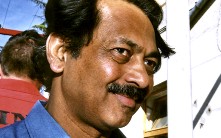Girish Kasaravalli
 Born in1947 in Malnad, province Kamtaka, in South India. His mother tongue is minority Kannadian. As a boy he acquainted himself with film through the touring cinema, which occasionaly stopped in their village. When his uncle gave him books on Indian cinema and when he saw a landmark film Samskara (1970), directed by P. R. Reddy, he decided to study film. He registered as a student at the Film and Televison Istitute of India in the year 1972. During the study he became familiarized with European author tradition of film, which had an enormous influence on his work. Three years later he graduated with a diploma film Arashesh (1975), for which he got the award for best student film of the year.
Born in1947 in Malnad, province Kamtaka, in South India. His mother tongue is minority Kannadian. As a boy he acquainted himself with film through the touring cinema, which occasionaly stopped in their village. When his uncle gave him books on Indian cinema and when he saw a landmark film Samskara (1970), directed by P. R. Reddy, he decided to study film. He registered as a student at the Film and Televison Istitute of India in the year 1972. During the study he became familiarized with European author tradition of film, which had an enormous influence on his work. Three years later he graduated with a diploma film Arashesh (1975), for which he got the award for best student film of the year.
Kasaravalli is focusing on various periods of Indian socio-political history in which there are conflicts between tradition, religion and identity of individual. He doesn’t agree with commercial Bollywood production which doesn’t take into consideration minority films and which – according to his own words – ’streamlined human experience into formulas’. Production of his films lasts for several years, he writes his own scripts and is a perfectionist when it comes to editing and cinematography. He is one of the most sensible Indian directors, the only one who got National Award for Best Film (Golden Lotus) four times.
» interview with Girish Kasaravalli from Isola Cinema 2004 festival
» 2nd interview with Girish Kasaravalli
» 3rd interview with Girish Kasaravalli
- filmography:
- 1975 Arashesh (kratki film)
- 1977 Ghata Shradhdha (The Ritual)
- 1979 Akramana (The Siege)
- 1981 Mooru Dhaarigalu (Three Path Ways)
- 1987 Tabarana Kathe (The Story of Tabara)
- 1989 Bannadha Vesha (The Mask)
- 1989 Mane (The House)
- 1996 Kraurya (Cruelty)
- 1998 Taayi Saaheba
- 2002 Dweepa/The Island

